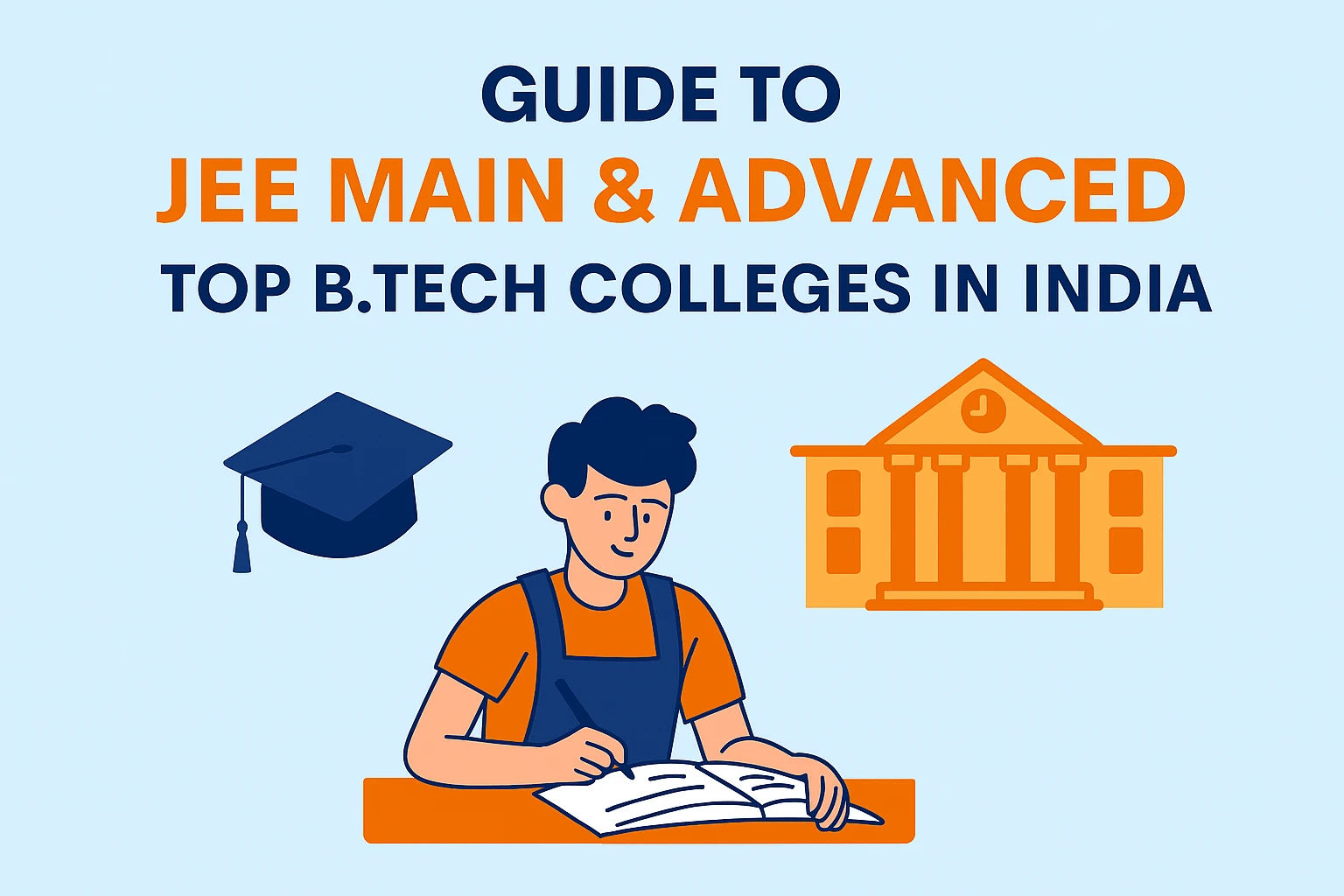For thousands of students across India, securing a seat in a prestigious B.Tech college is a dream that starts with JEE Main & Advanced. In fact, these exams are widely regarded as two of the most competitive engineering entrance tests in the world. Every year, over 10 lakh students appear for JEE Main, and only a fraction of them qualify for JEE Advanced, which serves as the gateway to the elite Indian Institutes of Technology (IITs).
Preparing for these exams is not just about memorizing formulas or practicing hundreds of questions—it’s about strategic planning, time management, and conceptual clarity. Specifically, while JEE Main focuses on testing your understanding of core concepts and speed, JEE Advanced challenges your problem-solving abilities, analytical thinking, and application of knowledge in complex scenarios.
Moreover, with the rising competition, it’s essential for aspirants to adopt a structured preparation strategy. For instance, this involves understanding the syllabus in depth, practicing previous year papers, taking mock tests, and focusing on both strengths and weaknesses. Additionally, choosing the right colleges to target based on your expected rank can greatly influence your preparation strategy and career trajectory.
In this guide, we will explore everything you need to know to prepare effectively for JEE Main & Advanced, including:
- A detailed overview of the exam patterns and syllabus
- How to create a successful study plan for both exams
- Recommended books and online resources
- Effective practice and revision strategies
- Common mistakes to avoid during preparation
- And a curated list of top B.Tech colleges in India to aim for, including IITs, NITs, IIITs, and reputed private institutions
Whether you are a beginner just starting your JEE journey or someone looking to refine your strategy, this guide will provide actionable insights to maximize your chances of success and secure admission to one of India’s top engineering colleges.
Furthermore, by following the tips and strategies in this guide, you’ll be able to approach the exams with confidence, clarity, and a competitive edge, giving yourself the best chance to turn your dreams into reality.
Table of Contents

Understanding JEE Main & Advanced
Before diving into preparation, it’s crucial to understand the structure of both exams. To begin with, here’s an overview:
JEE Main
- Conducted by NTA (National Testing Agency)
- Gateway for admission to NITs, IIITs, and GFTIs
- Covers Physics, Chemistry, and Mathematics
- Multiple-choice and numerical questions
- Focuses on conceptual clarity and speed
JEE Advanced
- Conducted for admission into IITs
- More challenging than JEE Main
- Tests problem-solving, analytical skills, and in-depth understanding
- Questions often have multiple correct answers, integer-type, and matching-based questions
Consequently, understanding the pattern helps you tailor your study strategy accordingly.
Creating an Effective Study Plan
Success in JEE Main & Advanced depends on having a solid, well-planned strategy. Therefore, here’s how to structure it:
1. Daily, Weekly, and Monthly Planning
- Break down the syllabus into manageable chunks
- Allocate more time to weaker subjects
- Include time for revision and practice tests
2. Subject-wise Focus
- Physics: Focus on numerical problems and conceptual understanding
- Chemistry: Cover physical, organic, and inorganic chemistry thoroughly
- Mathematics: Practice problem-solving and formulas regularly
3. Time Management Tips
- Prioritize high-weightage topics first
- Alternate subjects to avoid monotony
- Use timers to practice speed and accuracy
Best Study Resources for JEE
To excel, selecting the right resources is key. For example, here are some recommendations:
Books
- Physics: Concepts of Physics by H.C. Verma, I.E. Irodov
- Chemistry: NCERT, O.P. Tandon
- Mathematics: R.D. Sharma, M.L. Khanna, Arihant series
Online Resources
- NTA’s official website for syllabus and mock tests
- Educational platforms like Khan Academy, Vedantu, Unacademy
- YouTube channels for problem-solving tutorials
Previous Year Papers & Sample Papers
- Solve at least 5–10 years of previous papers
- Helps identify frequently asked questions and difficulty trends
Tips for Conceptual Understanding
- Avoid rote learning; understand fundamental concepts
- Practice derivations, formulas, and their applications
- Focus on problem-solving rather than memorization
- Make short notes for quick revision before exams
Practice & Mock Tests
Regular practice is crucial for scoring high in JEE. Specifically, follow these steps:
- Take weekly mock tests under exam conditions
- Analyze results to find weak areas
- Revise concepts that are repeatedly causing mistakes
- Simulate time-bound exams to build speed and accuracy
Time Management During the Exam
To maximize your score, effective time management is essential. For instance:
First, read all questions and start with easier ones.
Next, don’t spend excessive time on a single problem.
Additionally, keep an eye on the clock.
Finally, attempt questions strategically to maximize marks and avoid negative marking.
Handling Stress & Staying Motivated
To stay focused, maintain a balanced routine with breaks and leisure.
Moreover, meditate or practice light exercises to reduce anxiety.
Furthermore, stay positive and avoid comparison with peers.
Lastly, celebrate small achievements to maintain motivation.
Common Mistakes to Avoid
First, avoid ignoring weaker subjects.
Second, don’t rely excessively on coaching material.
Third, never skip mock tests.
Finally, steer clear of procrastination and last-minute cramming.
In summary, avoiding these pitfalls can improve your performance significantly.
Top B.Tech Colleges in India to Target
After preparation, the next step is knowing where to aim. For example:
1. Indian Institutes of Technology (IITs)
- Leading IITs including Bombay, Delhi, Madras, Kanpur, and Kharagpur
- Known for world-class faculty and research opportunities
2. National Institutes of Technology (NITs)
- NIT Trichy, NIT Surathkal, NIT Warangal
- Good infrastructure and campus placements
3. Indian Institute of Information Technology (IIITs)
- IIIT Hyderabad, IIIT Bangalore
- Specialize in IT and computer science courses
4. Other Top Private Engineering Colleges
- BITS Pilani, VIT Vellore, Manipal Institute of Technology
- Excellent placements and modern campuses
Tip: Use your JEE Main & Advanced rank to target colleges strategically, keeping your preferences in mind.
For more details on top engineering colleges, check out Top Engineering Colleges in India.
Conclusion
Cracking JEE Main & Advanced requires a blend of strategy, consistency, and hard work. Moreover, with the right study plan, practice, and understanding of exam patterns, you can secure admission to some of India’s top B.Tech colleges. In addition, staying focused, avoiding common mistakes, and keeping your motivation high are key factors for success.
Explore related insights in Top 10 Medical Universities in the World 2026, Engineering Placements 2025–26: IITs vs. Private Universities, or IITs vs NITs.
FAQs
Q1: How many hours should I study daily for JEE?
A1: Ideally 6–8 hours of focused study, increasing to 10–12 hours closer to exams with proper breaks.
Q2: Is coaching necessary for JEE preparation?
A2: Coaching helps with guidance, but self-study with good resources and discipline can also work.
Q3: How can I improve my speed and accuracy in exams?
A3: Regular practice, mock tests, and analyzing mistakes can help improve both speed and accuracy.
Q4: Which is better, JEE Main or Advanced preparation first?
A4: Focus on JEE Main fundamentals first; Advanced requires deeper problem-solving skills, which builds naturally afterward.
Q5: Can I target IITs and NITs simultaneously?
A5: Yes, JEE Main scores are used for NITs, while JEE Advanced is needed for IITs. Planning your preparation accordingly is essential.
For more educational resources, visit NIRF Official Website.


